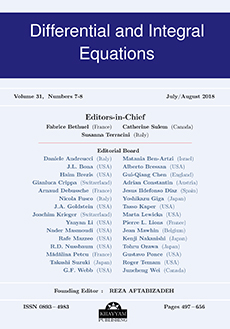Abstract
It is well known that, for $\varepsilon =0$, all solutions of the equations \[ \begin{cases} x''(t)+p(t)x(t-\varepsilon )=0,\quad t\in [1,+\infty ), \\ {x''(t)+p(t)x(t)+\frac{1}{t^{\alpha }} x\left( t-\frac{\varepsilon }{t^{\beta }}\right) =0,\quad t\in [1,+\infty ),} \end{cases} p(t)\ge c>0, \] are bounded on $[1,+\infty )$ and even tend to zero, as $p(t { \mathrel{\mathop{\longrightarrow}_{t\to +\infty}}}+\infty $. Here we obtain the following results: 1) for each positive $\varepsilon $ there exist unbounded solutions of the first equation; 2) for each positive $\varepsilon $ there exist unbounded solutions of the second equation in the case when $\alpha \ge 0$, $\beta \ge 0$, $\alpha +\beta \le 1$ and $p(t)$ is bounded; 3) all solutions of the equation \[ x^{\prime\prime}(t)+p(t)x(t-\tau(t))=0,\quad t\in [1,+\infty), \] with positive nondecreasing and bounded on $[1,+\infty)$ coefficient $p(t)$ are bounded if and only if $ \int _1^{+\infty} \tau(t)\,dt <\infty. $
Citation
A. Domoshnitsky. "Unboundedness of solutions and instability of differential equations of the second order with delayed argument." Differential Integral Equations 14 (5) 559 - 576, 2001. https://doi.org/10.57262/die/1356123256
Information





